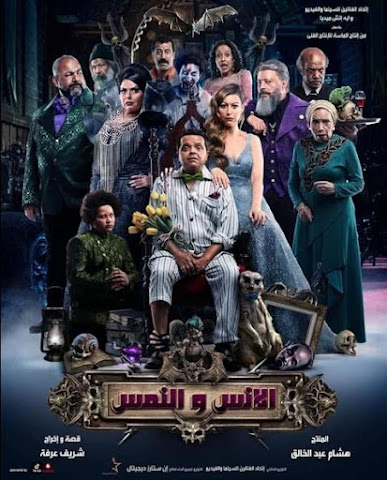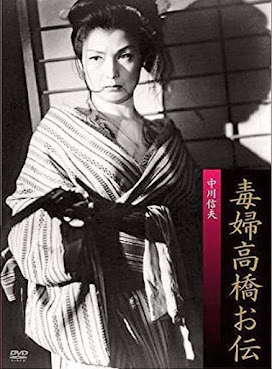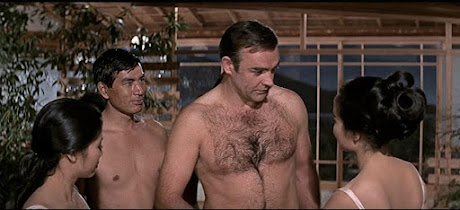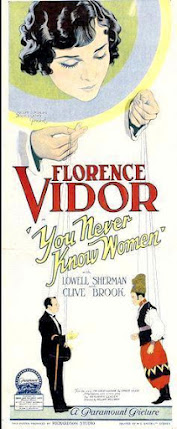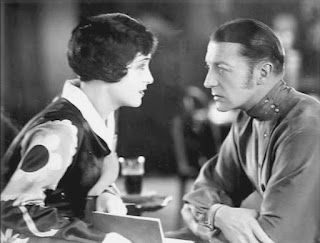 |
| Chahine |
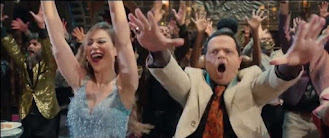 |
| Menna Shalabi & Mohamed Henedy. |
Muhammad Yasin’s 2003 Askar fi el-mu'askar/Asker Fel-Moasker/ Askar at the Camp/ Sodiers of the Camp, the earliest of the translated Henedi films, runs to some ambitious staging. It is done mainly in brief comic sketches, linked by scattered plot elements - military training, (cf. Bob Hope in Caught in the Draft among others) a blood feud (think Ugo Tognazzi in Questione d’onore), the friendship with chubby army buddy Maged El Kedwany (like Aamir Kahn in Laal Singh Chaddha), Moh’s wedding to the appealing Lekaa El Khomaisy or the disillusion of finding his history teacher uncle Salah Abdulla become Hassan Kolonia the Perfumer, a night club entertainer.
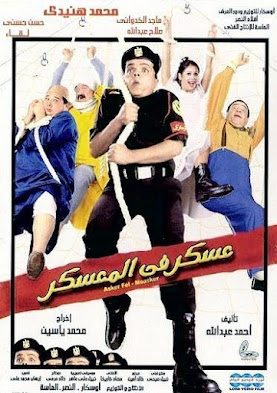 |
| Soldiers of the Camp. |
The wedding is the film’s high point with chanting women, a blazing torch parade, Moh on horseback with an AK 16, armed guards protecting the ceremony and checking guests while the couple huddle in a sandbag shelter. Complications involve Moh’s dad giving the bridal couple’s bedding to the bodyguards, along with the TV.
Our
hero’s army buddy Maged El Kedwany naturally turns out to be the son of
the enemy family. Despite all the security, El Kedwany is admitted as a
friend of the groom just by flashing an I.D. and comes under fire in
his own relatives’ raid, before he can do any avenging.
Moh
and the bride flee by train to Cairo, seeking once respectable uncle
Salah Abdulla. However he now shares a Cabaret stage with an energetic
redhead shimmy dancer, who is ambivalent about having the pair move
into her flat. She drags the bride into the bedroom and leaves the couch
to the men.
Uncle gets the newlyweds a job as costumed players in a Pharaonic show for tourists but the murderous feud catches up with them. Fleeing to a waste ground shanty, the lovers’ attempts to get it on are again thwarted. Sharing a truck load of sand has them once more frustrated, dumped on a building site.
For
a bit of cultural dissonance, how about Saadeya, the new wife, who Moh
had to threaten with a knife to get her to come across, now complaining
that she’s been a bride for three days and she’s still a virgin?
Moh’s attempt to
get a transfer away from the camp, where Metawali is also a soldier, is
rejected. Sharing the same bunkhouse proves fraught and Moh finds
himself on prisoner detail, hand cuffed to a soldier returning to his
home to be engulfed by his old neighbors before a suitably happy ending.
The
leads are winning and their material serves them well. Wide screen
colour production values are good and the unfamiliar setting catches
attention, rural local colour - Buffalo in the river, Moh saluting a
historic sculpture he passes - contrasted with metropolitan
landmarks - the Pointing Statue, the 6th of October Bridge or the fakey Cairo tourist show the pair are recruited into. This goes with
material like the scenes of military training - black uniforms in
choreographed hand to hand combat curiously like Beau Travaille.
Just when we are accepting the similarities with our own world we get
Moh protesting when his new wife goes marketing with her hair hanging
loose or the Sergeant’s first wife finding about the second.
Also on show is Henedy’s most widely offered film, the 2004 Fool el seen el azeem /The Great Chinese Beans directed by Sherif Arafa.
Here
the young Moh, who just wants to use his 51% college pass to get an
education, is have trouble sleeping, when a burglar breaks in and demands
the whereabouts of his gang Czar grand father. At this point, his
murderous uncles appear, telling him he’s failed the courage test. They
are barely restrained from offing the kid, instead getting him up in a
padded muscles suit to conduct their drug buy, where he escapes leaving
them behind. So it’s a matter of packing him off to his singer mum who
he blinded (!) when he dropped the chandelier on her, during one of her
performances in a B&W flashback.
His
father in law has Moh substitute for him in an Iron Chef competition in
China (actually Thailand) sending him off with a note in Chinese that
says he is carrying drugs, stolen by his hapless fellow passenger while
our hero is sucked into the jetliner loo for five hours.
Moh
is collected by the fetching girl translator in a cab, whose driver
keeps on throwing away cell ‘phones with unwelcome messages. Our hero
finds a fellow Arab from Beirut in the finals but a Chinese gang,
knowing his mob background, figures Mohamed must be there as a hitman
and hires him to off the judge, which he avoids by slipping the
passenger’s laxative into the meals - ho ho.
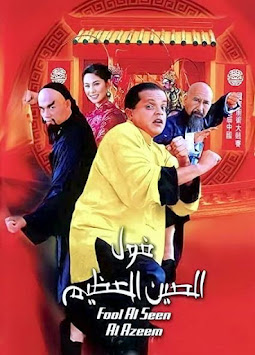 |
| The Great Chines Beans |
At
the cooking contest in disguise, Moh emerges from behind the pillar in
his chef outfit and wins, scarpering from the assassins but helping a
family to victory by using his falling out of tree skill. These films
are not strong on logical development.
There’s
some obvious wire work, which they demonstrate under the end credits
and a few alien moments like the lead encouraging “pray to the prophet!”
and joining the Lebanese chef in Arabism.
The
locating stock shots are fuzzy digital transfers, like the Egypt Air
in-flight material but technical standards are quite good and the pacing
carries things, with the leads appealing.
The showpiece here is the new El Ens W El Nems / Humans vs. the Mongoose,
again directed Sharif Arafah and clearly a prestige product from its
home industry. This big screen, contemporary piece kicks off with
Henedi’s family trying to reassure the Parks Inspector that their Kids
Fun Fair haunted house exhibit is not scary, despite jump shock figures
dropping out of the ceiling as they tour.
We
shift to domestic comedy with the family sharing the crowded home
bathroom over Mohamed’s objections. Out on the street, he stops a bus
hitting not quite pretty Menna Shalabi - who proves a remarkable screen
presence. Turns out she’s a Djinn (think Three Thousand Years of Longing) who now can’t get enough of him, being
under pressure having aged past the point where she qualifies for an
arranged marriage. She invites Mohamed to visit her family home, reached
through a fog bank past submerged sculptures, under the guidance of
identical, towering, formal dress butlers.
| Humans and the Mongoose. |
He
recruits Mohamed for his confrontation with tailed genie Bayoumi Fouad,
who ends up back in the scummiest bottle on earth with the prospect of being
buried under a toilet for the next thousand years.
Shalabi
is anxious to get on with the fecundation (a light shines under the
bedroom door) but Moh, who’s been told her dad will eat him afterward,
is somehow reluctant. However she assures him she won’t let that happen
to the father of her offspring and her brother adds to his defense, with
the now liberated genie joining his team. “If death is inevitable, it
is a shame to die a coward.”
Moh’s long-lost father also shows up to guide him to the magician who produces the leather incantation and the bottled spell to be dropped into one of the lava pits (which one?) to stave off the Djinns.
Some
nice urban drone shots as punctuation, lots of CG, which is good enough
(battle with the Mongoose) in an area where spectacular is common. This
one constantly evokes Hollywood models, Jim Carey, Ghostbusters, Men in Black,
along with an abrupt Bollywood number, and is paced by inscrutable
references like Hano Bavela. The mix is one of the things that
hold attention along with backing the winning leads with talented
(unfamiliar to us) comics and superior production values.
From
the indications in this small sample, Henedi’s films become more
ambitious and more approachable as they go. Their scatology without
nudity is not for all tastes but kids will devour these.
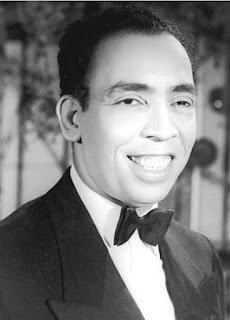 |
| Ismail Yasine |
Henedi is a more gifted career comedian. I’d place him middle of a scale above Toto, Cantinflas and Jerry Lewis, on a par with Red Skelton before he expanded into TV and maybe shaded by Bob Hope, Lino Banfi, Fernandel and Adam Sandler.
Significantly these comedians are handled dismissively by critics and never make it into festivals. When the horror films were treated this way, their admirers started their own festivals and the work was accepted into the fold. This has never happened with the comics.
However there’s another buzz to be had out of watching Mohamed Henedi’s films. It’s like being faced with Mehboob Kahn and Nargis in the fifties or Sammo Hung and the Shaw Brothers in the seventies. Those films were a bridge into a whole world of film going which we vaguely knew existed but had never been invited to enter. There’s the lure that maybe we can repeat that experience. It could be misleading but Henedi projects an enormously sympathetic personality. His comic timing is impressive and he occupies a space at once familiar and surprising to us. It can’t be a bad idea to discover the way the Arab world thinks of popular entertainment. I enjoy that.
